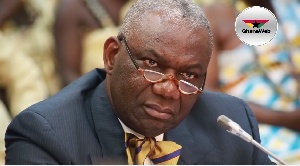Government says it will ensure that all non-residential facilities, including Ministries, Departments and Agencies countrywide, will adopt the solar rooftop programme initiated by the Energy Commission to help reduce their utility tariffs on electricity consumption and enhance their productivity levels.
Mr. Boakye Agyarko, the Minister of Energy, said the current rapid decline in the price of Solar PVs, made it cost competitive to integrate it into the electricity distribution system at the end-user’s point. “It was also now possible to generate power from this source for less than 60 Ghana Pesewas per kWh, compared to what was being paid as utilities for electrical energy consumption.”
He said this at the launch of the 16.64kWh Rooftop Solar PV System at the German Development Cooperation (GDC) office complex in Accra, to provide about 21,000 kWh of electricity per annum for the Cooperation for the next 20 years.
The Solar PV System at the GDC House was described as one of the first grid-connected systems in Ghana with no battery backup under the net metering framework.
Mr. Boakye Agyarko explained that the Energy Ministry in its firm believe in the system, set the pace in 1999, by installing a 50 Kilowatts (kWh) Solar PV Rooftop system on its building, and had since benefitted from an average generation of 156 kWh of power per day.
The system, he said had contributed between 13 to 18 per cent of the Ministry’s electricity consumption, as well as an average monthly savings of GH¢7,000.00 and GH¢90,000.00 yearly.
He urged other development partners to emulate and integrate solar into their buildings to reduce their net consumption and make available excess power to support other productivity ventures.
Commenting on Rooftop Solar PV System developed by the GDC, Mr Agyarko applauded the German government for the numerous assistance it had provided to Ghana over the years, in the field of Renewable Energy, as well as the for the finalization of the Net-Metering Code that prescribed guidelines for injecting excess generations from Solar Rooftops into the electricity distribution system for sale by the Electricity Company of Ghana.
Mr. Christoph Retziaff, the German Ambassador to Ghana, said Germany was committed to supporting Ghana’s endeavours in Renewable Energy and Energy Efficiency, which would contribute immensely to its sustainable economic development.
He said Germany was one of the leading countries transitioning from fossil fuel based economy to the one based on renewable energy, and was ready to share the lessons learnt during the transition.
Mr. Alan Walsch, the Country Director of the Deutsche Gesellschaft fur Zusammenarbeit (GIZ), said the GDC House, had been able to save GH¢13,925.15 between the mid October 2016 and February 2017 by using solar energy.
He said decision to procure the Solar PV system was informed by the rising cost of grid electricity and fuel for backup generators, as well as its partner the KfW’s desire to demonstrate the extremely cost competitiveness of the service in Ghana.
Business News of Tuesday, 28 March 2017
Source: b&ft.com













